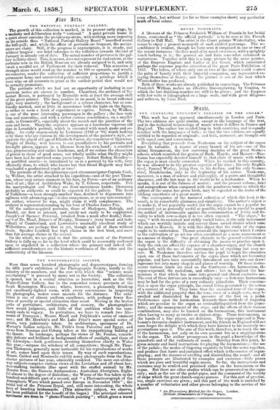Mush.
THE CHEVALIER NEVE OMIS' S TREATISE ON THE ono/41,4.4
This work has just appeared simultaneously in London and Paris. The two editions are quite similar, except in the language of the text, and in the technical terminology of music where it differs in France and England. The author has resided long in both countries, and is equally familiar with the languages of both ; so that the two editions are equally entitled to be regarded as originals ; and both, moreover, are brought out with equal care and correctness. Everything that proceeds from Neukomm on the subject of the organ must be valuable. A master of every branch of his art—one of the ultimi Roraanorum, the few surviving disciples of the great German schools which nourished the genius of Bach, Haydn, and Mozart—Neu- komm has especially devoted himself to that class of music with which the organ is most closely connected. When he resided in this country, he was allowed to be the greatest organist of his time ; his only English rival, Samuel Wesley, being then in his decline, and his only German rival, Mendelsohn, only in the beginning of his career. Neukomm, moreover, is a man of science and philosophy, of a grave and thoughtful character, and the lost man in the world to be a bookmaker. When he speaks, it is out of the fulness of matter ; and the present volume, brief and compendious when compared with the ponderous tomes to which the subject of the organ has given birth, may be regarded as the fruits of the lifelong experience of a great master.
One consequence of the matured reflection of which this book is the result, is its remarkable plainness and simplicity. The author's object is to make it, if not popularly useful (for the organ cannot be a popular in- strument) yet as generally useful as possible, while he is careful to guard the noblest of instruments against the contamination of levity and fri- volity to which now-a-days it is too often exposed. "The organ," he says, "with its sustained and richly varied tones, is the only instrument which can worthily imitate and convey those sacred strains which raise the mind to Heaven. It is with this object that the study of the organ ought to be undertaken. Thence arises all the importance which I attach to the cultivation of an art too often considered as a mere amusement or as a means of display." One great obstacle to the general cultivation of the organ is the difficulty of obtaining the means to practise upon it. Only the rich can afford the expense of a chamber-organ, and the church organ-loft, with the use of the instrument, is of anything but easy ac- cess. M. Neukomm therefore advises the pupil to begin his education upon one of those instruments of the organ class which are becoming popular, and have been successfully introduced not only into our draw- ingrooms but into many chapels and places of worship. Of these instru- ments various kinds are used on the Continent—the harmonium, the orgue-expressif, the melodium, and others ; but in England the har- monium is that which has come into general and almost exclusive use. The cost of these intruments is exceedingly easy—a first-rate harmonium may be had for the price of a very ordinary pianoforte. Their construc- tion is upon the organ principle, the sound being generated by the action of a current of wind. They have thus the sustained tone of the organ, with the additional property that the tone, even of a single note, may be swelled and diminished by the pressure of the foot on a pedal. Performance upon the harmonium demands those methods of fingering which are peculiar to the organ as contradistinguished from the piano- forte ; and the management of the stops, and the effects of their various combinations, may also be learned on the harmonium, this instrument often having so many as twelve or sixteen stops. These instruments, iii the hands of a fine player, are delicious. The orgue-expressif is Neu- komm's favourite chamber instrument, and his friends in England will not soon forget the delight with which they have listened to his masterly im- provisations upon it. The aim of this work, therefore, is to teach the use of the harmonium, not only on its own account but as a stepping-stone to the organ. The author presupposes in the pupil a knowledge of the pianoforte and of the rudiments of music. Starting from this point, he gives minute and lucid instructions for playing the harmonium ;—the use of the pedals ; the modes of fingering requisite to bind the notes together, and produce that legato and sustained effect which is the essence of organ- playing ; and the manner of swelling and diminishing the sound : and all these precepts are illustrated by examples and exercises—little pieces which are pure and beautiful organ music. So far, the instructions and exercises may be studied and practised either on the harmonium or the organ. But there are other studies which can be prosecuted on the organ only ; such as the use of the pedal-pipes, and the command of the variety of stops which the great church-organs possess. For this sort of practice, too, ample exercises are given ; and this part of the work is enriched by a number of voluntaries and other pieces belonging to the service of the church
• An Elementary Method for the Organ. London. Ifethade Elimentaire de l'Orgue. Paris.


































 Previous page
Previous page